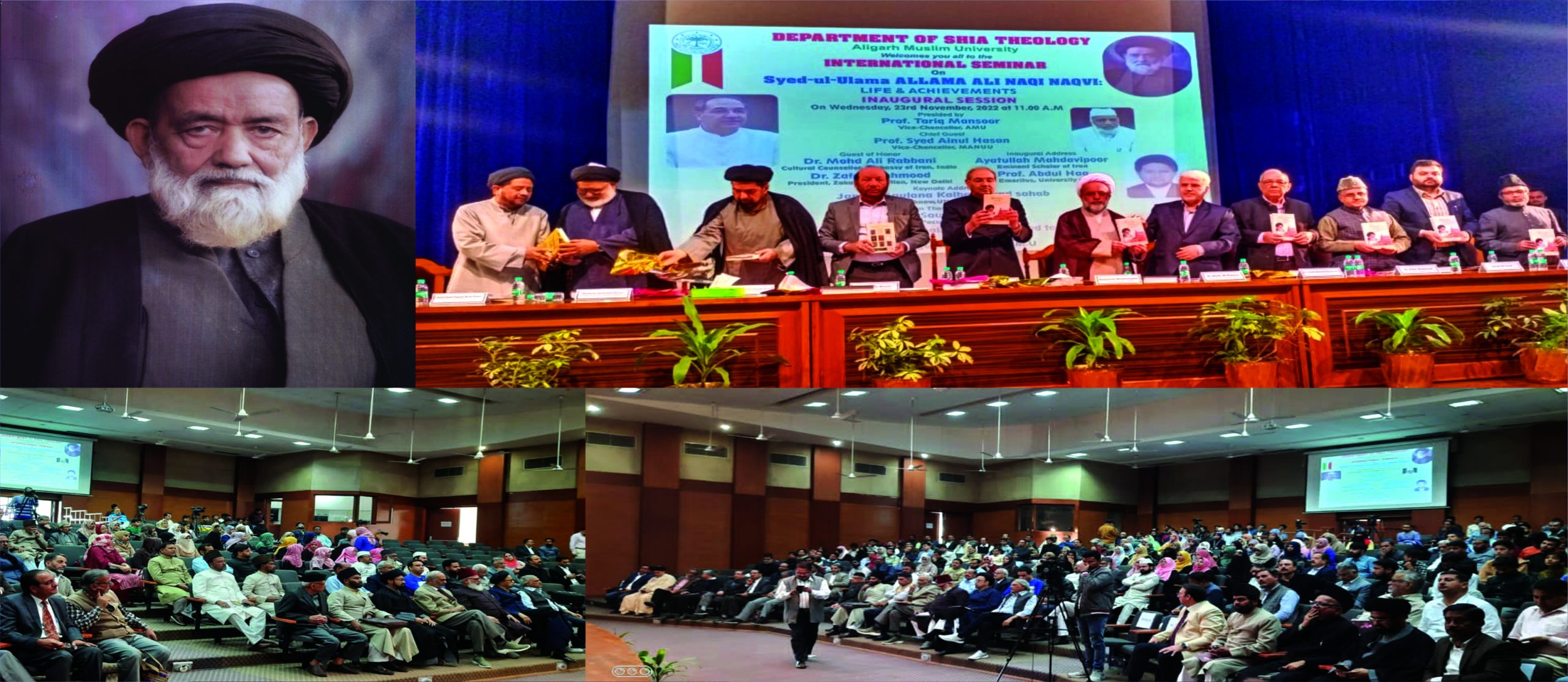Aligarh | WTNS | Nov 26: The department of Shia theology in AMU “ Aligarh Muslim University hold two-day theological discourse on Syedul-Ulema Ayatollah Ali Naqi Naqvi.
Through the prism of Ayatollah Haaj Mahdi Mahdavipour “Special envoy of the Supreme leader of Iran Grand Ayatollah Syed Ali Khamenei for India”.
“ Syedul-Ulema Ayatollah Ali Naqi Naqvi was not merely a Mujtahid of oracle attributes but had strong grip on translational crafts and was brimming with promethean creativity . He was a running Wikipedia of traditions, Islamic jurisprudence, theological, sociological and Political pyramids”. He was a celebrated Scholar of his day , he was discovered by numerous scholars of Najaf”.
Aligarh:WTNS: The department of Shia theology in AMU “ Aligarh Muslim University hold two-day theological discourse on Syedul-Ulema Ayatollah Ali Naqi Naqvi.
The seminar embarked on the remarkable scholastic and pedagogical journey of Syedul-Ulema Ayatollah Ali Naqi Naqvi.
“ Syedul-Ulema Ayatollah Ali Naqi Naqvi was not merely a Mujtahid of oracle attributes but had strong grip on translational crafts and was brimming with promethean creativity . He was a running Wikipedia of traditions, Islamic jurisprudence, theological, sociological and Political pyramids” He was a celebrated Scholar of his day , he was discovered by numerous scholars of Najaf”.
According to Wilayat Times, In his speech while addressing the inaugural session at the JNMC Auditorium, the Chief Guest Prof Ainul Hassan (Vice-Chancellor, Maulana Azad National Urdu University, Hyderabad) said, “Syedul Ulema was born in the era of socio-political decline of Muslims. The Muslim world, including Turkey, Iran, Afghanistan, and India was facing the onslaught of Western imperialism. At that time, Ayatollah Ali Naqi Naqvi with his intellectual acuity and rational ability interpreted theological issues enabling Islamic teachings to live up the challenges thrown open by the modern world.
Throwing light on the political and intellectual scenario of the late nineteenth century and the first half of the twentieth century Professor Syed Ainul Hassan said that Ayatollah Naqvi pitched for unity and brotherhood. His three hundred books and more than one thousand articles bear testimony to his academic caliber and Ijtehad.
In his presidential remarks, AMU Vice-Chancellor Prof. Tariq Mansoor said, “Allama Ali Naqi Naqvi was a great intellectual whom we became familiar with during our student days at AMU.
“He had no formal university education yet his knowledge stemming from academic rigour made him a profound scholar who was recognized globally. His example tells us that having a high academic degree is not enough for a person to be called as educated and good behavior and conduct with intellectual bearings is necessary”, Prof Mansoor emphasized.
The Vice-Chancellor said that great scholars like him have served in the Faculty of Theology of AMU. “It is the responsibility of today’s faculty members and students to carry forward his legacy and encourage high academic standards and environment in the Department. The university administration is always ready to provide all kinds of support in this regard”, he said.
Prof. Mansoor further said, “AMU is a unique institution in the sense that modern sciences are taught here along with oriental subjects. This uniqueness can strengthen our reputation and identity with quality teaching and research. There is a need for teachers to take this fact into consideration, neglect trivial matters and spend their energy on greater issues”.
Talking about the inter-faith dialogue, the Vice-Chancellor said there should be peace and tolerance among the followers of different religions. “Commonalities should be highlighted while paying attention to bridging the gulf by putting aside the differences”, he stressed.
Professor Mansoor further stressed upon the Shia-Sunni unity and strengthening bonds between communities.
The Vice-Chancellor hoped that people would emulate Ali Naqi Naqvi.
In the opening remarks, Iran’s renowned scholar and representative of Supreme Leader Ayatollah Syed Ali Khamenei for Indian sub-continent Ayatollah Haaj Mahdi Mahdavipour said that Syedul Ulema Ayatollah Ali Naqi Naqvi was a visionary mujtahid who was not only knowledgeable in tafsir and hadith but also had command of jurisprudence, theology, philosophy and sociology. He was a distinguished scholar of his times and various scholars from Najaf recognized his contributions.
The guest of honour Dr. Mohd. Ali Rabbani (Cultural Counsellor, Embassy of Iran, New Delhi) said that Syedul Ulama was a great intellectual who resisted the invasion of modernity, imperialism and western civilization and strongly defended Islamic teachings.
“Ayatollah Naqi Naqvi was an expert in various streams of knowledge and he interpreted Islamic teachings with intellectual rationality. He used to emphasize on dialogue and outreach, owing to which he became popular in every circle” Dr. Rabbani said.
Speaking on interfaith relations Dr. Zafar Mahmood (Zakat Foundation of India) said “in the Holy Qur’an, the phrases “Lord of mankind” and “Lord of the worlds” have appeared repeatedly, which tells that mankind is one big family and race, colour, sex and tribe are for identification purposes only”.
He further said, the importance of dialogue and communication has been highlighted in all religions, and the Constitution of India, the United Nations Charter and other international documents have equally given priority to interfaith dialogue and interaction, as the most beautiful plant in the world is love which grows in hearts.
Prof. Syed Tayyab Raza Naqvi (Chairman, Department of Shia Theology and Director of the Seminar) delivered the welcome address and delineated the topic of the seminar.
In the later session, Maulana Safi Haider (Secretary, Tanzeemul Makatib, Lucknow), Maulana Kalbe Jawad Naqvi, Prof. Hakeem Syed Zillur Rahman, Shahid Mehdi (Former Vice Chancellor, Jamia Millia Islamia), Mr. Ali Zaidi (Chairman, Shia Central Waqf Board, Lucknow) and other dignitaries expressed their views.
In the opening session, Dr. Asghar Ajaz proposed the vote of thanks, and Dr. Shariq Aqeel conducted the proceedings.
On this occasion, the translation of Tafsir Majma Al-Bayan, and a book on Syedul Ulama by Dr. Asghar Ajaz were also released.



